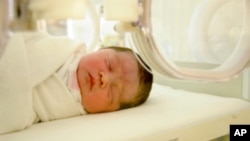Giving a combination of drugs to the newborns of HIV-positive women cuts the infants' risk of becoming infected with the virus that causes AIDS in half, according to the National Institutes of Health (NIH).
Typically, HIV-positive women are given antiviral drugs during their pregnancy to reduce the risk of passing on their infections to their babies, either in the womb, during labor and delivery, or when they breast feed. Without that maternal drug treatment, between 25 and 50 percent of those newborns will become infected.
Investigators with the National Institutes of Health and an international network of hospitals and medical centers looked at three drug therapies aimed at reducing mother-to-child HIV transmissions.
Researchers found that the standard antiviral drug zidovudine (AZT), combined with another drug called nevirapine, significantly reduce transmission of the AIDS virus to newborns compared to AZT alone. Nevarapine lowers the amount of virus in the blood.
NIH's Heather Watts, who co-authored the study, says the women in the trial did not know before labor and delivery that they were HIV-positive.
"In some cases they had a negative HIV test earlier in pregnancy and then were retested during labor and delivery and were found to be positive," Watts says, "or in some cases they knew they were positive but they hadn't come in for care, and then just showed up for delivery."
The study, which involved 1,600 infants, was conducted in the U.S., Brazil, Argentina and South Africa between 2004 and 2010. The newborns received one of three antiviral treatments within 48 hours after birth.
One group got AZT for six weeks. A second group received AZT plus nevirapine for that time. The third group of infants got a six-week regimen of AZT, plus 3TC, which is similar to AZT, and the protease inhibitor nelfinavir, which belongs to a different class of drugs.
Investigators found the mother-to-child HIV transmission rate among newborns who received AZT alone around the time of delivery was 4.8 percent. The three-drug cocktail cut the rate of mother-to-baby transmission in half, to 2.4 percent, shortly after birth. But Watts says that regimen caused a condition called neutropenia, a blood disorder which lowers levels of some infection-fighting white blood cells.
However, researchers found the two-drug combination of AZT and nevirapine given to infants shortly after birth reduced the risk of early transmission to 2.2 percent and did not cause neutropenia. Infants can later become infected with the AIDS virus if their mothers breast-feed them, rather than giving them formula.
Watts says the AZT-nevirapine 'cocktail' not only has fewer complications than the other anti-HIV therapies, but both drugs are also inexpensive.
"Actually, antiretroviral drugs have become increasingly available for treatment for pregnancy in low-resource settings. So this is something that should be available."
Typically, HIV-positive women are given antiviral drugs during their pregnancy to reduce the risk of passing on their infections to their babies, either in the womb, during labor and delivery, or when they breast feed. Without that maternal drug treatment, between 25 and 50 percent of those newborns will become infected.
Investigators with the National Institutes of Health and an international network of hospitals and medical centers looked at three drug therapies aimed at reducing mother-to-child HIV transmissions.
Researchers found that the standard antiviral drug zidovudine (AZT), combined with another drug called nevirapine, significantly reduce transmission of the AIDS virus to newborns compared to AZT alone. Nevarapine lowers the amount of virus in the blood.
NIH's Heather Watts, who co-authored the study, says the women in the trial did not know before labor and delivery that they were HIV-positive.
"In some cases they had a negative HIV test earlier in pregnancy and then were retested during labor and delivery and were found to be positive," Watts says, "or in some cases they knew they were positive but they hadn't come in for care, and then just showed up for delivery."
The study, which involved 1,600 infants, was conducted in the U.S., Brazil, Argentina and South Africa between 2004 and 2010. The newborns received one of three antiviral treatments within 48 hours after birth.
One group got AZT for six weeks. A second group received AZT plus nevirapine for that time. The third group of infants got a six-week regimen of AZT, plus 3TC, which is similar to AZT, and the protease inhibitor nelfinavir, which belongs to a different class of drugs.
Investigators found the mother-to-child HIV transmission rate among newborns who received AZT alone around the time of delivery was 4.8 percent. The three-drug cocktail cut the rate of mother-to-baby transmission in half, to 2.4 percent, shortly after birth. But Watts says that regimen caused a condition called neutropenia, a blood disorder which lowers levels of some infection-fighting white blood cells.
However, researchers found the two-drug combination of AZT and nevirapine given to infants shortly after birth reduced the risk of early transmission to 2.2 percent and did not cause neutropenia. Infants can later become infected with the AIDS virus if their mothers breast-feed them, rather than giving them formula.
Watts says the AZT-nevirapine 'cocktail' not only has fewer complications than the other anti-HIV therapies, but both drugs are also inexpensive.
"Actually, antiretroviral drugs have become increasingly available for treatment for pregnancy in low-resource settings. So this is something that should be available."









